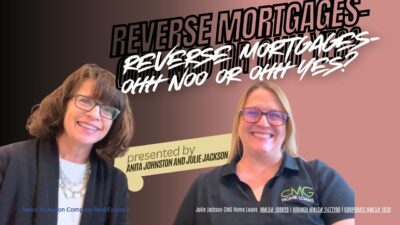Reverse Mortgages- Are They That Scary

Anita Johnston Realtor and Julie Jackson CMG Home Loan Lender
Reverse Mortgages: Are They That Scary?
When it comes to navigating the world of homeownership and financial planning, reverse mortgages often come with a cloud of confusion and fear. But are they really as intimidating as they seem? Anita Johnston, a trusted Compass WA realtor, and Julie Jackson, a seasoned expert with CMG Home Loans, are here to break down the myths and shed light on the realities of reverse mortgages. Together, they’ll help you understand if this financial tool is right for you or your loved ones.
What Is a Reverse Mortgage?
A reverse mortgage is a type of loan available to homeowners aged 62 and older, allowing them to convert a portion of their home equity into cash. Unlike traditional mortgages, where you make monthly payments to the lender, a reverse mortgage works in reverse: the lender pays you. This can be in the form of a lump sum, monthly payments, or a line of credit. The loan is typically repaid when the homeowner sells the home, moves out, or passes away.
Why Do Reverse Mortgages Have a Bad Reputation?
Reverse mortgages have often been misunderstood, leading to their portrayal as risky or predatory financial products. Anita Johnston explains that much of the fear stems from outdated information and misconceptions. “In the past, reverse mortgages were less regulated, and some homeowners found themselves in financial trouble. However, today’s reverse mortgages are much safer due to stricter federal regulations and improved consumer protections,” she says.
Julie Jackson agrees, adding, “The fear often comes from a lack of understanding. Many people believe that they’re signing away their home or leaving their heirs with nothing, but that’s not necessarily the case. Reverse mortgages can actually be a smart financial strategy for the right individual.”
The Benefits of a Reverse Mortgage
- Supplementing Retirement Income
For retirees who are house-rich but cash-poor, a reverse mortgage can provide much-needed financial relief. Julie Jackson explains, “It’s a way to tap into your home equity without having to sell your home or take on monthly mortgage payments. This can make a big difference for those on a fixed income.” - Flexibility in Payment Options
Reverse mortgages offer flexibility in how you receive funds. Whether you prefer a lump sum, monthly payments, or a line of credit, this tool can be tailored to meet your financial needs. - Staying in Your Home
Anita Johnston highlights that one of the biggest advantages is the ability to stay in your home. “For many seniors, their home is more than just a financial asset—it’s a place filled with memories. A reverse mortgage allows them to age in place while benefiting from their home’s equity.” - Non-Recourse Loan
Reverse mortgages are non-recourse loans, meaning you or your heirs will never owe more than the home’s value, even if the loan balance exceeds it. This provides added peace of mind for families.
The Potential Risks
While reverse mortgages offer numerous benefits, they’re not without risks. Anita Johnston and Julie Jackson stress the importance of understanding the fine print.
- Accumulating Interest
Since you’re not making monthly payments, the loan balance grows over time as interest accrues. This can reduce the amount of equity left in your home. - Impact on Heirs
If you plan to leave your home to your heirs, it’s essential to discuss how a reverse mortgage might affect their inheritance. Julie Jackson advises, “Your heirs will need to repay the loan if they want to keep the home, which could mean selling the property or refinancing.” - Ongoing Costs
Homeowners are still responsible for property taxes, insurance, and maintenance. Failing to keep up with these obligations could put the loan in default.
Who Is a Good Candidate for a Reverse Mortgage?
A reverse mortgage isn’t for everyone, but it can be a valuable tool for the right person. Anita Johnston suggests it may be a good fit for homeowners who:
- Are 62 or older and plan to stay in their home long-term.
- Need additional income to cover living expenses or medical costs.
- Have significant equity in their home.
- Are comfortable with the idea of reducing the equity in their home over time.
Julie Jackson adds, “It’s crucial to consult with a trusted financial advisor, lender, and realtor to fully understand how a reverse mortgage fits into your overall financial plan.”
Final Thoughts: Knowledge Is Power
Reverse mortgages don’t have to be scary. With the right guidance and a clear understanding of the pros and cons, they can be an effective financial tool for seniors looking to enhance their retirement years. Anita Johnston and Julie Jackson emphasize the importance of working with professionals who prioritize education and transparency.
“At the end of the day, it’s about making informed decisions,” says Anita. “A reverse mortgage isn’t that scary.